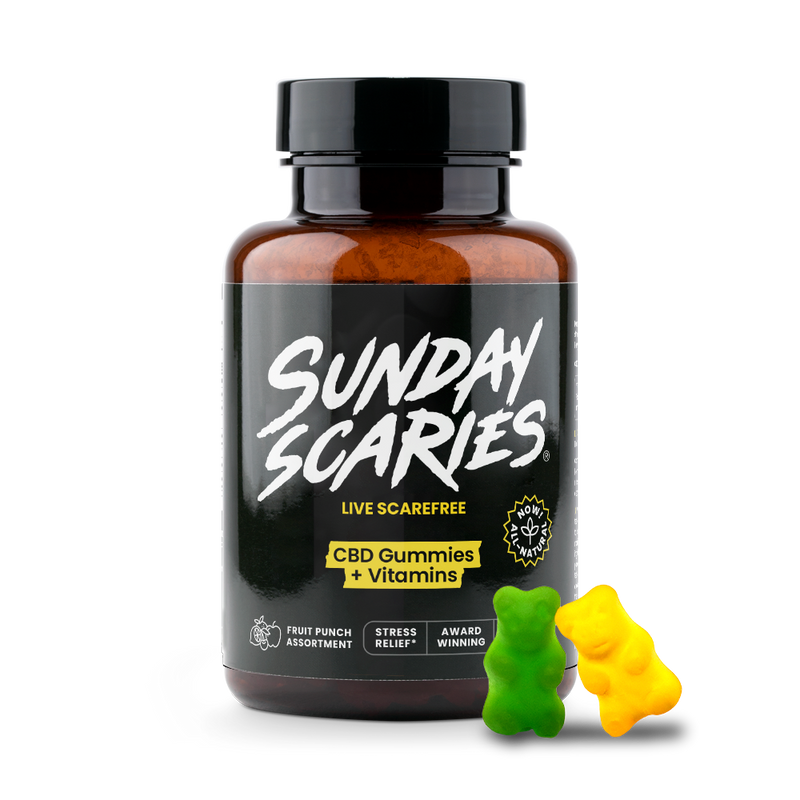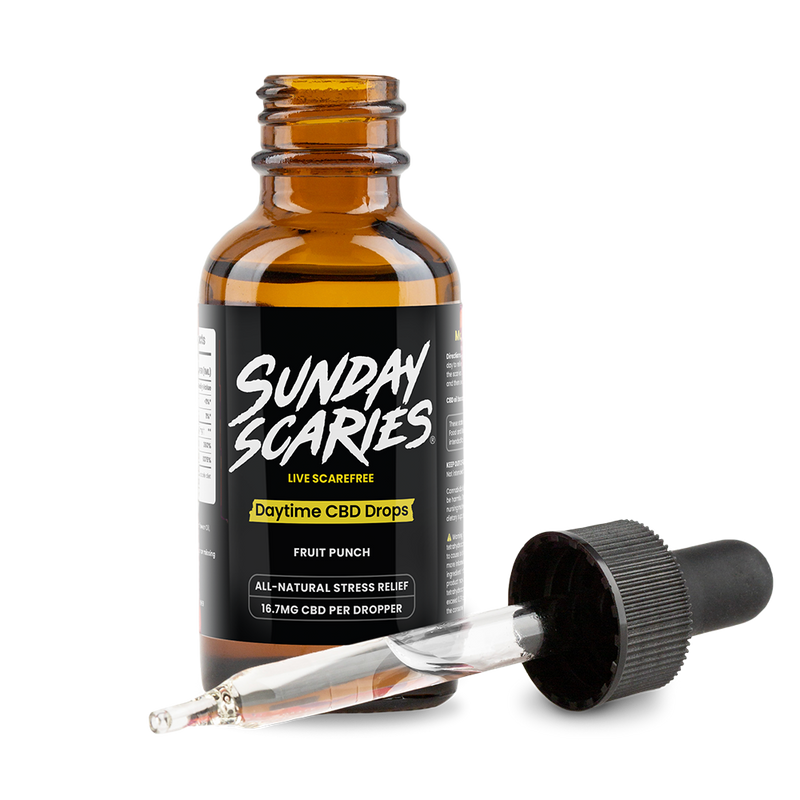
CBD vs. CBG: Understanding the Differences and Benefits

CBD and CBG are both non-psychoactive cannabinoids found in hemp and marijuana plants, offering distinct therapeutic benefits. CBD is widely known for its effects on stress reduction, sleep improvement and anti-inflammatory properties, while CBG shows promise in neuroprotection, antibacterial activity, and appetite stimulation.
Cannabinoids, the active compounds found in the cannabis plant, have garnered significant attention for their potential therapeutic benefits.
Among these, Cannabidiol (CBD) and Cannabigerol (CBG) stand out as two of the most promising and widely discussed cannabinoids.
While they share some similarities, CBD and CBG differ in their chemical structure, effects, and potential benefits.
This comprehensive guide explores the differences and benefits of CBD and CBG. Understanding the differences between CBD and CBG can help individuals choose the right cannabinoid for their specific wellness needs.
What is CBD?
Definition and Origin
Cannabidiol (CBD) is a non-psychoactive cannabinoid found in cannabis plants. It was first discovered in 1940 and has since become a major focus of medical and wellness research due to its potential therapeutic properties.
- For more detailed information on the definition of CBD, check out our resource: What is CBD?
Mechanism of Action
CBD interacts with the body's endocannabinoid system (ECS), which plays a crucial role in regulating various physiological processes, including pain, mood, sleep, and immune response.
Unlike THC (tetrahydrocannabinol), CBD does not produce a "high" because it does not bind directly to CB1 receptors in the brain. Instead, it influences the ECS by modulating receptor activity and promoting the production of endocannabinoids.
- For more detailed information on the difference and benefits, check out our resource: CBD vs. THC
Potential Benefits of CBD
Please note that while users are reporting these benefits of CBD, more research needs to be performed on the cannabinoid before scientific claims can be made.
1. Stress and Mood: CBD has shown promise in reducing stress and elevating mood in both human and animal studies. It is believed to enhance the signaling of serotonin, a neurotransmitter that regulates mood and social behavior.
2. Pain Relief: CBD is widely recognized for its analgesic properties. Studies have shown that CBD can help reduce body aches by interacting with neurotransmitters and reducing swelling.
3. Sleep Aid: CBD, especially when supplemented with CBN, can help induce sleep, keep you slumbered throughout the night and enable you to wake up feeling non-groggy unlike other sleep medications.
4. Anti-inflammatory Effects: CBD may help reduce inflammation, making it a perfect study candidate for conditions like arthritis and inflammatory bowel disease.
5. Skin Health: CBD's antioxidant properties make it a popular ingredient in skincare products, where it is purported to help with acne, eczema, and other skin conditions.
What is CBG?
Definition and Origin
Cannabigerol (CBG) is often referred to as the "mother of all cannabinoids" because it is the precursor from which other cannabinoids, including CBD and THC, are synthesized. CBG is found in smaller quantities compared to CBD and THC, making it a rare and valuable cannabinoid.
- For more detailed information on the definition of CBG, check out our resource: What is CBG?
Mechanism of Action
Like CBD, CBG interacts with the ECS, but it has a unique profile of action. CBG binds to both CB1 and CB2 receptors, albeit with a lower affinity than THC. This dual binding capability allows CBG to influence a wide range of physiological processes.
Potential Benefits of CBG
Please note that while users are reporting these benefits of CBG, more research needs to be performed on the cannabinoid before scientific claims can be made.
1. Anti-inflammatory Properties: CBG has shown strong anti-inflammatory effects, which make it an ideal research candidate for treating conditions like inflammatory bowel disease and other chronic inflammatory conditions.
2. Neuroprotective Effects: CBG may help protect neurons from damage, making it a potential treatment for neurodegenerative diseases such as Huntington's disease and Parkinson's disease.
3. Antibacterial Activity: CBG is being studied for its potent antibacterial properties, particularly against methicillin-resistant Staphylococcus aureus (MRSA), a strain of bacteria resistant to many antibiotics.
4. Glaucoma Relief: CBG has been shown to reduce intraocular pressure, making it a potential future treatment for glaucoma.
5. Appetite Stimulation: Unlike CBD, CBG may stimulate appetite, which can be beneficial for individuals experiencing appetite loss due to medical conditions or treatments.
Key Differences Between CBD and CBG
Chemical Structure and Origin
- CBD is derived from cannabidiolic acid (CBDA), while CBG originates from cannabigerolic acid (CBGA).
- CBG is the precursor to other cannabinoids, including CBD, THC, and CBC (cannabichromene).
Psychoactivity
- CBD is non-psychoactive, meaning it does not produce a "high."
- CBG is also non-psychoactive but may have more noticeable effects on mood and cognition due to its interaction with CB1 and CB2 receptors.
Interaction with the ECS
- CBD primarily modulates the ECS by influencing receptor activity and enhancing endocannabinoid production.
- CBG binds directly to CB1 and CB2 receptors, which can lead to different therapeutic effects.
Availability and Extraction
- CBD is more abundant in cannabis and hemp plants, making it easier and more cost-effective to extract.
- CBG is found in smaller quantities, making its extraction more challenging and expensive. The increase in extraction cost is usually past down to the customer, making CBG products more expensive.
How to Choose Between CBD and CBG
Intended Use
- For general wellness, stress, sleep, muscle ache relief, and skin health, CBD is often the preferred choice due to its well-documented effects and availability.
- For specific conditions like inflammatory bowel disease, neurodegenerative disorders, bacterial infections, and glaucoma, CBG may offer more targeted benefits, although more studies need to be performed to verify this.
Product Types
- CBD products include CBD gummies, extra strength CBD gummies, vegan CBD gummies, CBD gummies for focus and concentration, CBD candy, CBD sleep oils, CBD tinctures, CBD edibles, capsules, topicals, and vape products. These are widely available and come in various strengths and formulations.
- CBG products are less common but can be found as oils, tinctures, capsules, and topicals. Due to the rarity of CBG, these products may be more expensive.
Do CBD Products Contain CBG?
Dosage and Consumption
- CBD dosage varies depending on the individual's needs, the condition being treated, and the product type. It is generally recommended to start with a low dose and gradually increase until the desired effects are achieved. A normal starting point is 10-20mg of CBD per dose.
- CBG dosage is less established, but similar principles apply. Starting with a low dose and monitoring the effects is advisable. A normal starting point is 5-10mg of CBG per dose.
Potential Side Effects and Safety
CBD Side Effects
CBD is generally well-tolerated, but some individuals may experience side effects such as:
- Dry mouth
- Diarrhea
- Fatigue
- Changes in appetite and weight
CBG Side Effects
Research on CBG's side effects is limited, but it is generally considered safe. Potential side effects may include:
- Dry mouth
- Changes in appetite
- Mild digestive issues
Interactions with Medications
Both CBD and CBG can interact with certain medications, particularly those metabolized by the liver's cytochrome P450 enzyme system.
It is essential to consult with a healthcare provider before starting CBD or CBG, especially if you are taking other medications.
Legal Status of CBD and CBG
United States
- CBD derived from hemp (containing less than 0.3% THC) is legal at the federal level, but state laws may vary.
- CBG derived from hemp is also legal at the federal level, though it is subject to the same state regulations as CBD.
International
- The legal status of CBD and CBG varies by country. Some countries have embraced the use of these cannabinoids for medical purposes, while others have strict regulations or outright bans. Its also important to note that certain countries do not distinguish hemp vs. marijuana, so even if you're traveling with a hemp product, their authorities may just classify it as marijuana. Bring these products to other countries at your own risk.
Future Research and Developments
Why Aren't There More Studies Around CBD & CBG
Both CBD and CBG are the subjects of ongoing research to better understand their mechanisms of action, potential therapeutic uses, and long-term effects. Clinical trials and preclinical studies continue to explore their efficacy in treating various medical conditions.
Emerging Trends
- Combination Products: Products combining CBD and CBG are gaining popularity, leveraging the synergistic effects of multiple cannabinoids to enhance therapeutic benefits.
- Minor Cannabinoids: As research progresses, other minor cannabinoids like CBC, CBN (cannabinol), THCV (tetrahydrocannabivarin) and THCA (tetrahydrocannabinolic acid) are also being explored for their potential benefits.
Industry Growth
The CBD and CBG market is expected to continue growing as consumer awareness increases and new products are developed.
Innovations in extraction and formulation techniques will likely make these cannabinoids more accessible and affordable.
Conclusion
CBD and CBG are two of the most promising cannabinoids, each offering unique benefits and therapeutic potential.
While CBD is well-known for its wide range of applications and availability, CBG is emerging as a valuable cannabinoid with distinct properties.
Understanding the differences between CBD and CBG can help you make informed decisions about which cannabinoid is best suited to your needs.
Whether you are seeking relief from body aches, stress, sleep problems, inflammation, or other conditions, both CBD and CBG hold promise as natural, plant-based remedies that support overall wellness.
As research continues and the industry evolves, the future looks bright for these remarkable cannabinoids.
Frequently Asked Questions
Is there CBD and CBG in THC Edibles?
Yes, THC edibles, including THC gummies and Delta-9 gummies, can contain both CBD and CBG, although the presence and concentration of these cannabinoids depend on the specific product formulation.
Some edibles are designed to provide a balanced blend of THC, CBD, and CBG to harness the combined benefits of these cannabinoids, enhancing effects such as pain relief, relaxation, and anti-inflammation.
However, it's essential to check the product label or manufacturer's information to understand the exact cannabinoid profile of the THC edibles you're considering.

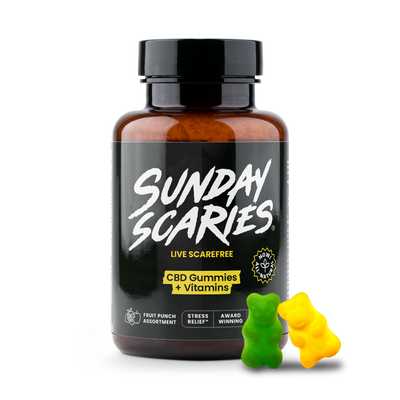 CBD Gummies
Stress Relief
CBD Gummies
Stress Relief
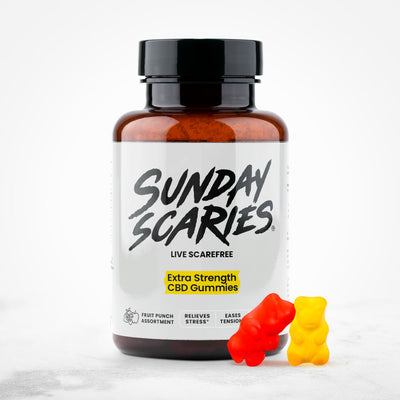 Extra Strength CBD Gummies
Stress Relief
Extra Strength CBD Gummies
Stress Relief
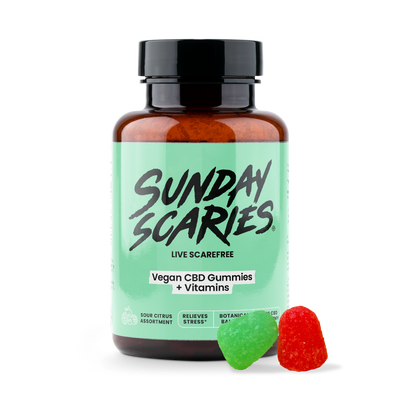 Vegan CBD Gummies
Stress Relief
Vegan CBD Gummies
Stress Relief
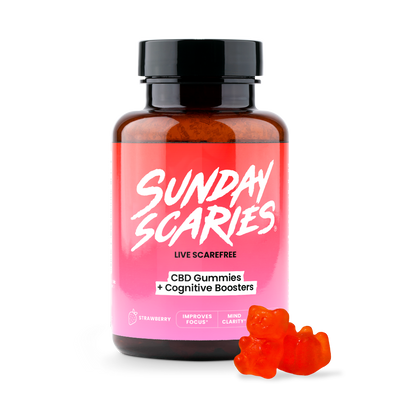 CBD Gummies for Focus
Focus Boost
CBD Gummies for Focus
Focus Boost
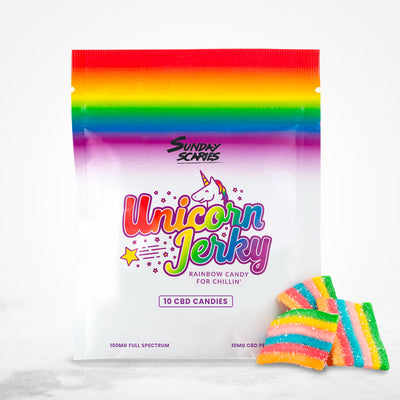 CBD Candy
Mood Lift
CBD Candy
Mood Lift
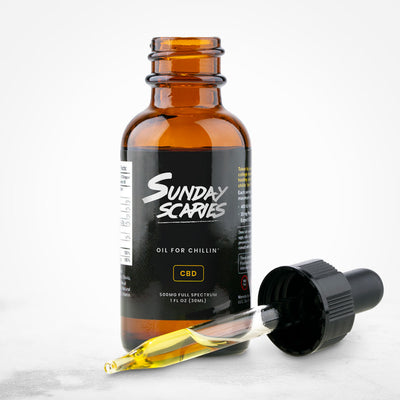 CBD Daytime Oil
Stress Relief
CBD Daytime Oil
Stress Relief
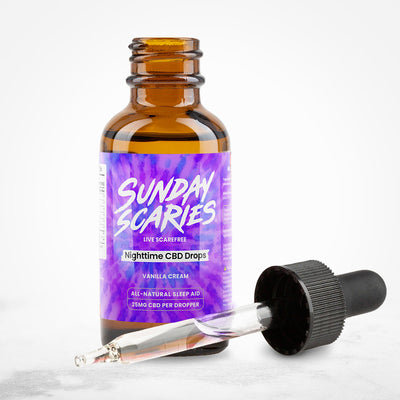 CBD Sleep Oil
Sleep Aid
CBD Sleep Oil
Sleep Aid
 CBD Dog Treats
Stress Relief
CBD Dog Treats
Stress Relief
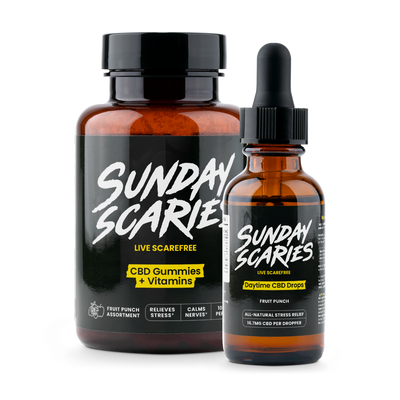 Side Piece Bundle
Stress Relief
Side Piece Bundle
Stress Relief
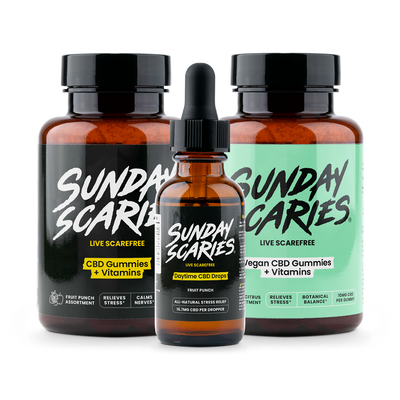 Rando Bundle
Stress Relief
Rando Bundle
Stress Relief
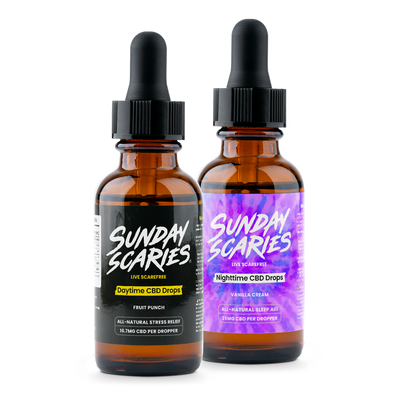 Sunrise & Sunset CBD Oil Bundle
Stress Relief
Sunrise & Sunset CBD Oil Bundle
Stress Relief
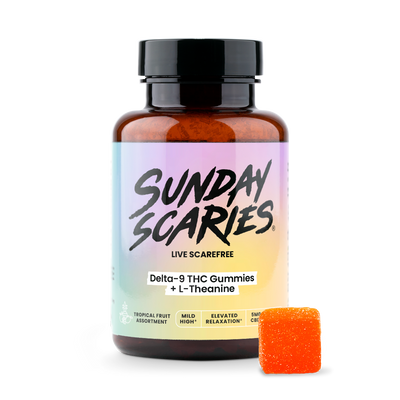 5mg Delta-9 Gummies
Euphoria
5mg Delta-9 Gummies
Euphoria
 10mg Delta-9 Gummies
Euphoria
10mg Delta-9 Gummies
Euphoria
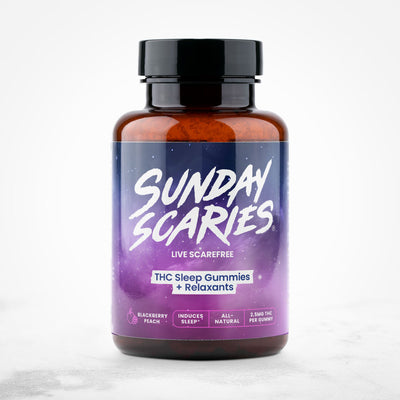 THC Gummies for Sleep
Sleep Aid
THC Gummies for Sleep
Sleep Aid
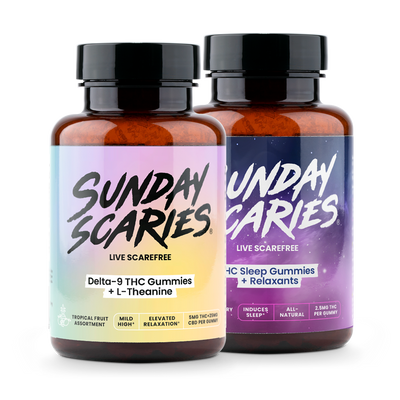 Day & Night THC Gummies Bundle
Stress Relief
Day & Night THC Gummies Bundle
Stress Relief
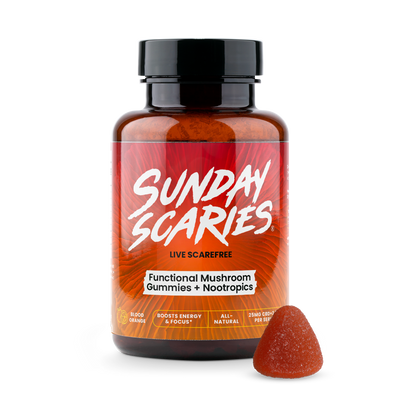 Mushroom Gummies
Focus Boost
Mushroom Gummies
Focus Boost
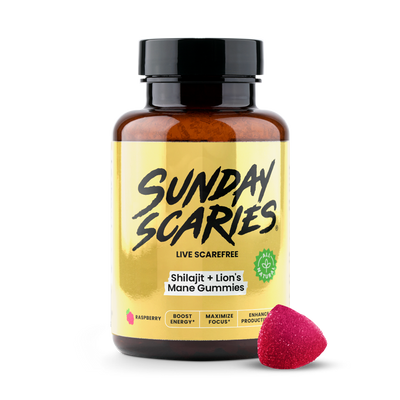 Shilajit Gummies
Focus Boost
Shilajit Gummies
Focus Boost
 Sunday Scaries Hat
Sunday Scaries Hat
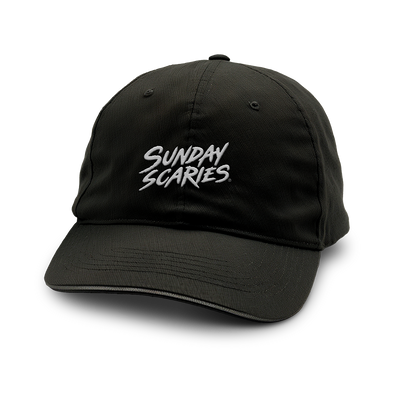 Sunday Scaries Dad Hat
Sunday Scaries Dad Hat
 Sunday Scaries T-Shirt
Sunday Scaries T-Shirt
 Sunday Scaries Pocket Tee
Sunday Scaries Pocket Tee
 Sunday Scaries Tank Top
Sunday Scaries Tank Top
 Sunday Scaries Sweatshirt
Sunday Scaries Sweatshirt
 Sunday Scaries Blanket Jacket
Sunday Scaries Blanket Jacket
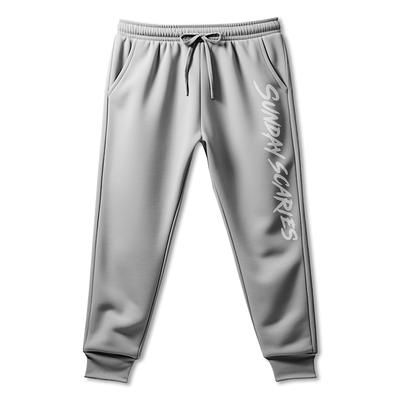 Sunday Scaries Sweatpants
Sunday Scaries Sweatpants

